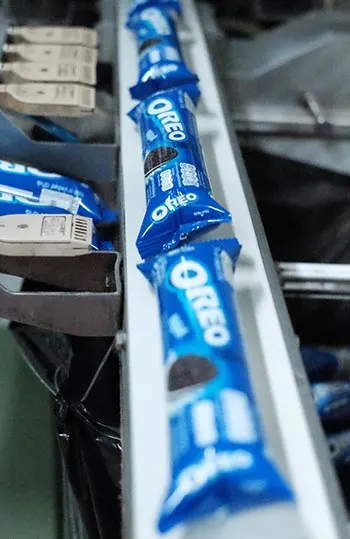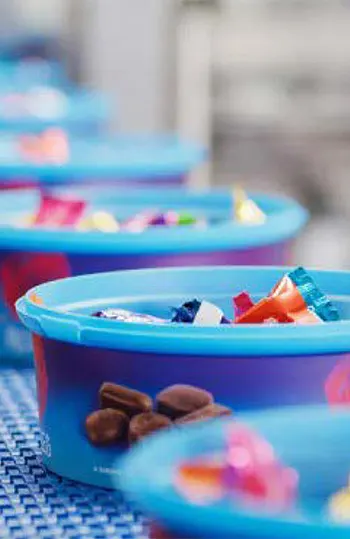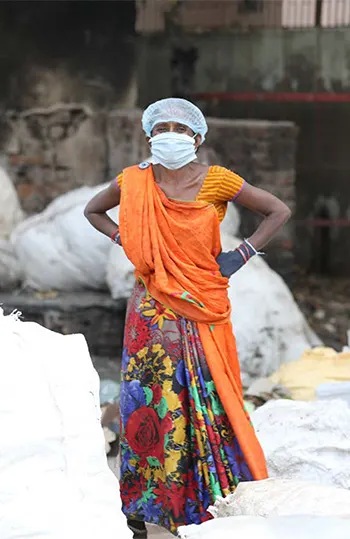Advancing More Sustainable Packaging
We work hard to use packaging that does more than protect our products and delight our consumers. At Mondelēz International, we strive to continually improve our packaging with the long-term aim of advancing our support for a more circular economy for packaging.
Strategic Approach
We believe that by improving our packaging and measuring our performance, we can make progress toward our long-term aim of advancing our support for a more circular economy for packaging. Our three-part approach includes:
Reducing Packaging by aiming to utilize packaging that is lightweight, safe and, where appropriate can be reused or recycled.
Evolving Packaging involves aiming to design our packaging to be recyclable, removing problematic materials, and including recycled plastic, where appropriate, to help reduce packaging waste.
Improving Systems means supporting the development of infrastructure and capabilities with the aim of being able to collect the packaging we place on the market. We support the implementation of effective policy including Extended Producer Responsibility (EPR), that helps enable the development of collection systems for all types of packaging. We are collaborating with other companies, policymakers, investors and other key actors to help advance this work.
While we continue to progress in implementing our strategy, constrained supply of food contact recycled plastic, restrictions on the use of recycled plastic for food contact packaging in some markets, the high cost of new materials, the complexity of implementing novel packaging solutions across a complex global network, and the slower than anticipated scaling of circular systems remain challenges that need to be overcome in collaboration with peers, governments and other key actors as we continue to work toward achieving our long-term aim of advancing our support for a more circular economy for packaging.
Learn more about each of these three parts below.

Reducing Packaging
We continue to progress towards achieving our 2025 goal of 5% reduction in our use of virgin plastic packaging versus 2020 levels. Our reduction of virgin plastic packaging by 4.6% vs. 2020 levels by 2024 exemplifies our teams’ ability to execute with excellence and use materials more efficiently, incorporate recycled plastic and convert to alternative materials e.g., paper.
For rigid plastic packaging, we are working to offset high category growth and reduce our use of virgin plastic by eliminating packaging and using more recycled content. For example, our Southeast Asia Business Unit reduced virgin plastic use by approximately 150 metric tonnes by eliminating plastic trays across our cookie portfolio, including Oreo, Chipsmore and Cosy brands.

Evolving Packaging
We continue to evolve our packaging materials to be more sustainable. In alignment with industry guidelines, we have made progress in reducing our use of problematic materials and designing our packaging to be recyclable.
We are working across our company to understand local needs, educate suppliers on Mondelēz International requirements, improve industry standards and help amplify impact through cross-industry collaboration. We continue to support the advancement and adoption of the Consumer Goods Forum’s Golden Design Rules, and as members of the Ocean Plastics Leadership Network (OPLN) are helping to influence more sustainable production of chemically recycled flexible plastic.
We also continue to increase our use of recycled plastic. In North America we are converting plastic cookie trays to include up to 50% recycled PET, and our UK & Ireland Business Unit Cadbury is wrapping Cadbury tablets in packaging made using certified recycled plastic, reducing virgin plastic use by ~600 metric tonnes per year.
We are also converting from plastic packaging to alternative materials where beneficial. For example, Cadbury converted from plastic to paper outerwrap for its Fingers and Animals multipacks, and LU introduced paper packaging for Véritable Petit Beurre, Petit Brun Extra, and LU Thé biscuit multipacks.

Improving Systems
To achieve a more circular economy for packaging, we believe that it is critical that the systems and infrastructure exist to collect, sort and recycle packaging waste. As such, we are working with many companies, investors, suppliers policymakers and other critical stakeholders to help improve policy design, help implement optimal EPR and invest in new technologies and infrastructure.
We are also working to help advance the development of optimal EPR in various markets around the world. In the US, through our membership of the Consumer Goods Forum Plastic Waste Coalition of Action we helped establish the EPR Leadership Forum (ELF) and as founding board members of the Circular Action Alliance are working with other companies to help implement effective EPR in California, Colorado, Oregon and other states. Finally, through the Circulate Capital Ocean Fund and LA fund we are investing to help advance the development of waste collection and recycling infrastructure in India, Southeast Asia, Latin America and the Caribbean.
Our Progress
OUR AIM* | 2024 PERFORMANCE |
|---|---|
Approximately 98% or more of our packaging designed to be recyclable by 2030 | 96% |
5% reduction in virgin plastic by 2025 (vs. 2020) | (4.6)% |
25% reduction in rigid virgin plastic by 2030 (vs. 2020) | 1.4% |
5% recycled plastic content by 2030 | 1.6% |
*We aim to regularly and transparently report our progress. You can find additional details on our goals within the About This Report section of our 2024 Snacking Made Right ESG Report.
Working Together
Working to help advance a more circular economy demands infrastructure development, investment, an enabling policy and regulatory environment, and cooperation between multiple stakeholders. There are many challenges that may impede the advancement of a circular economy for packaging, including a landscape of disconnected national and sub-national policies, the need to transform complex global supply chains, and the sourcing of high cost and limited availability materials.
Collaboration is key to overcoming challenges and achieving progress. We collaborate with many companies and other stakeholders on topics ranging from innovation of more sustainable alternative materials to helping develop optimal policies. Examples include: